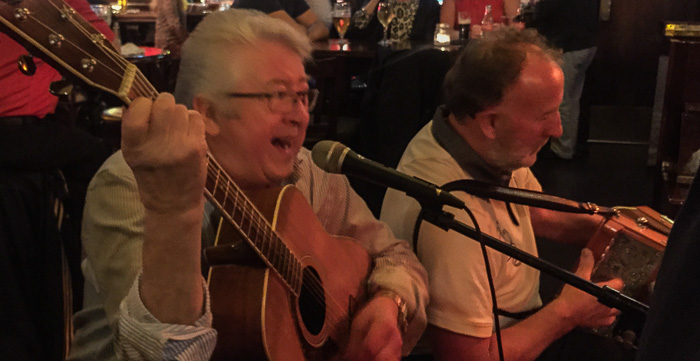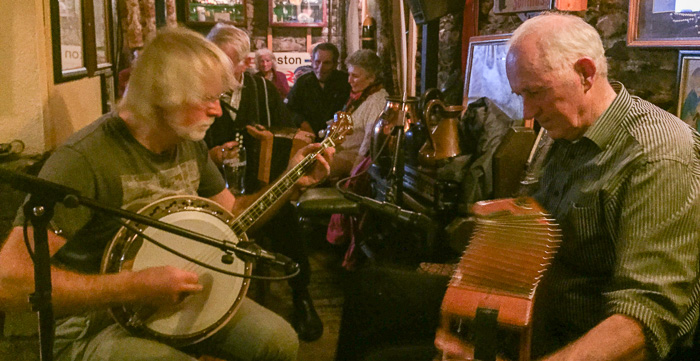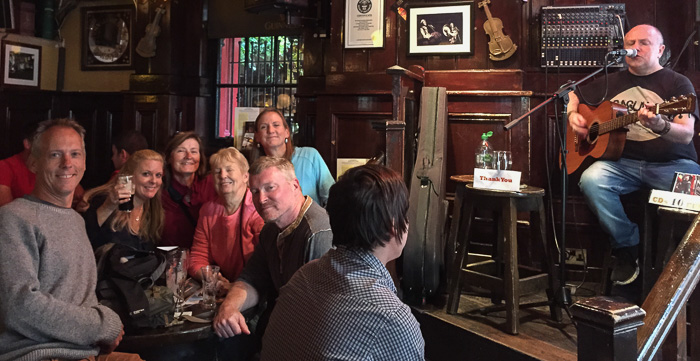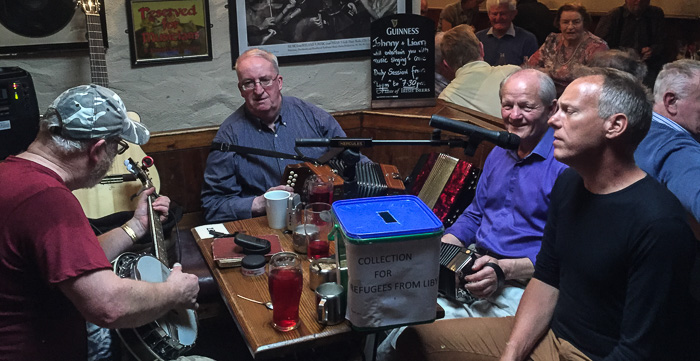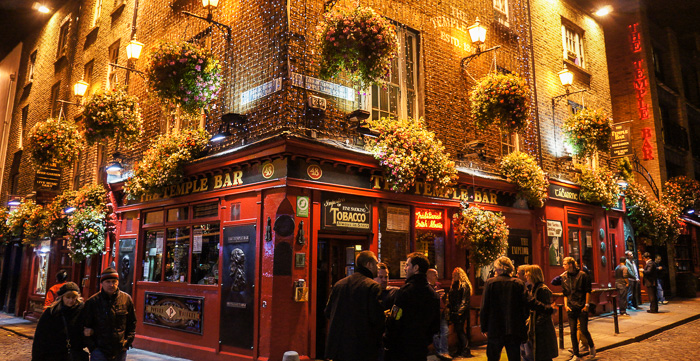The One Thing You MUST Do in Ireland: Find Live Traditional Music!
Traveling Ireland, you’re bound to see sandwich boards advertising the words Live, Irish, Traditional, Trad, Music, or Session in various combinations such as “Live Music”, Traditional Irish Music“, or ”Trad Session". It’s important to note they don’t mean the same thing. We were in Ireland for 6 weeks, heard live music at least 15 times, and each experience was unique. So what’s the difference and how can you find what you’re looking for? I’m no expert, but we actively sought live music week after week and were lucky enough to chat with musicians in Belfast, Doolin, Camp and Dublin. Here’s what we gleaned:
First off, if a pub sign says “Live Music” and you want to hear live Irish music, ask for clarification before settling in. We had high hopes in Ballycastle and waited for a good 45 minutes for the band to finish setting up only to find they played rockabilly. They were very good, but it was a letdown.
If a pub advertises Irish, traditional, or trad music, it’s safe to bet you’ll hear Irish music played by professional musicians, meaning they’ve been hired by the pub to entertain. They may be paid in drinks, or the promise of free advertising for their latest CD, but their mission is to play for you, the patron. When you throw the word “session” into the mix, things get interesting.
A true traditional Irish music session is not a performance for patrons, but rather a shared experience amongst the musicians themselves. Think of it like a jam session with musicians playing to enjoy the music and hone skills.There’s no stage or microphones; in fact musicians usually commandeer tables in a corner of the pub and sit in a loose circle facing each other. As customers in the bar, we’re just lucky to listen in.
So when you see a “session” advertised, is this the scene you’ll find? Not necessarily! A session in Bowe’s in Dublin had six musicians in the corner including one guy on uilleann pipes (rare!) and no one sang. The Fountain Bar in Belfast had seven musicians when we arrived, grew to about 13, sang every 4th song or so, but remained in a circle, albeit a big one by the end! The Railway Tavern in Camp had three core musicians, one with a microphone, alternated music and song, and talked with the crowd. We visited this pub twice and both times they invited patrons to join in, step up to the mic, and sing and/or play.
Bottom line: there’s a spectrum. If you stop into a pub and the music isn’t to your liking, try another! We’ve seen everything from a single musician with an acoustic guitar to the 13-member extravaganza mentioned above. Most often, we found 1–3 musicians, typically playing acoustic guitar or accordian but we also heard fiddle, bodhrán, tin whistle, flute, banjo and uilleann pipes. The more session-driven, the less music I recognized. Touristy pubs tended to play upbeat popular Irish classics like Irish Rover, Whiskey in the Jar, or honestly any of the songs I loaded into my “Irish Songs to Learn” Spotify play list.
In the beginning, I was very invested in finding pubs off the beaten track. I thought I needed to find a non-touristy place to have an “authentic” experience. Oh boy, what a crock! Ireland seems to have as many talented musicians as they do rocks in their fields; we found good music everywhere. And those popular touristy places get popular for a reason - they have amazing music! Sure, drinks may be overpriced at The Temple Bar in Dublin, but they have a fun atmosphere, hire killer musicians, and I’ve always had a rollicking good time. That’s worth something.
In the end, I valued each experience whether traditional or touristy, mellow or raucous. No matter where you land, pay heed to these tips we picked up along the way:
- Take a nap: Live music often starts late. To have enough energy after a full day of sightseeing, take a quick nap to recharge, then head out for dinner and music. Of course there are exceptions. One of our favorite sessions was from 4-7pm at Gus O'Connor's in Doolin.
- Go early: Unless you want to stand the whole time, head to the pub early and settle in. How early depends on the pub of course, but if music is advertised for 9:30, be there by 9:00 and don’t expect the music to start until at least 10:00.
- Be discreet: Keep conversation muted and take photos on the sly. This applies mainly to smaller pubs offering intimate trad sessions, but even in loud bars catering to tourists, musicians appreciate polite customers who are paying attention.
- Don’t request songs: …unless asked.
- Buy something: Pubs pay musicians and you’re enjoying said entertainment. If you’re taking up a stool or table, support the business. You don’t have to purchase alcohol, but buy a soda, crisps, anything.
- Don’t clap: Or do. It’s kind of complicated. We were told (by an Irishman) that it’s impolite to clap since others can’t hear as well. Instead, gently tap a finger or toe in time with the music. But in another pub, the musicians raised hands and asked us to clap along. So to clap or not to clap? If it’s a quiet session, don’t. If invited by the musicians, do. If unsure, hold back, observe, and do what the locals are doing.
- Prepare a piece: Be ready to get up and sing a song if asked. What?! Sounds nuts, but hear me out. About a half-dozen times, musicians casually inquired “Do you sing?” and we mostly demurred, but each time Chris was directly asked, he got up and sang. It changed things. Instead of being apart, we became a part of - in a small way to be sure, but impactful. When you share music, you share more deeply of yourself than the surface “Where are you from?”, “How long are you staying?”, and “How about that rain?”. Singing is not my forte so I only did it twice and was rather uncomfortable both times. Next time, I’ll practice a song I dearly love (not Irish music) until it’s ingrained, but also memorize a fun poem. In Gus O’Connor’s in Doolin, an Irishman captivated for 5 solid minutes reciting a long-form poem with bawdy surprise ending. It was a tour de force that I’ll never match, but I’d surely be more comfortable speaking than singing!
Finally, the best way to find music is to ask tour guides, B&B owners, shop-keepers, waiters, ... anyone. We also searched online and found a few sites like this one that compile session listings. Of course, you can also just walk around, listen, and let the music carry you in.
